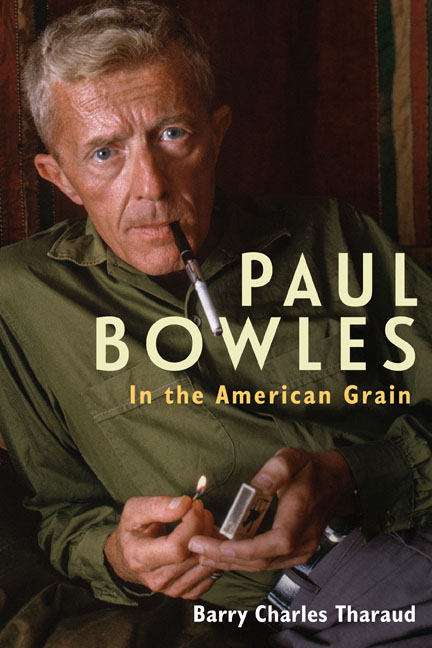Book contents
- Frontmatter
- Contents
- Preface
- Acknowledgments
- Abbreviations
- Introduction: Paul Bowles as a Canonical Writer
- 1 Paul Bowles on Intercultural Understanding: Too Far from Home
- 2 The Discovery of Existence: Without Stopping
- 3 Emersonian Shadows
- 4 Culture and Existence in Bowles’ Short Fiction
- 5 Gide and Bowles in North Africa: The Sheltering Sky
- 6 Language, Noise, Silence: Self and Society in Let It Come Down
- 7 The Spider’s House: The Social Construction of Reality
- 8 Existence and Imagination: Up Above the World
- 9 The Letters: In Touch
- Conclusion
- Bibliography
- Index
1 - Paul Bowles on Intercultural Understanding: Too Far from Home
Published online by Cambridge University Press: 24 November 2020
- Frontmatter
- Contents
- Preface
- Acknowledgments
- Abbreviations
- Introduction: Paul Bowles as a Canonical Writer
- 1 Paul Bowles on Intercultural Understanding: Too Far from Home
- 2 The Discovery of Existence: Without Stopping
- 3 Emersonian Shadows
- 4 Culture and Existence in Bowles’ Short Fiction
- 5 Gide and Bowles in North Africa: The Sheltering Sky
- 6 Language, Noise, Silence: Self and Society in Let It Come Down
- 7 The Spider’s House: The Social Construction of Reality
- 8 Existence and Imagination: Up Above the World
- 9 The Letters: In Touch
- Conclusion
- Bibliography
- Index
Summary
PAUL BOWLES’ FICTION is often thought of as depicting the impenetrability of foreign cultures and, by implication, the impossibility of significant intercultural understanding. Tourists such as the Slades in Up Above the World find themselves in a Central American landscape that is as alien as their murderous host's psychological landscape; the “sojourners” Port and Kit in The Sheltering Sky find death and insanity in the Sahara; the missionary in “Pastor Dowe at Tacaté” penetrates the culture of a Latin American indigenous tribe and subsequently flees in horror; the professor in “A Distant Episode” has considerable intercultural experience including a knowledge of French and Arabic in North Africa, but is destroyed because of his inadequate understanding of the Reguibat renegades he encounters; and the French expatriate woman in “The Time of Friendship,” despite all the good will in the world, is shut out from contact with an Arab child because of political events. In short, whatever commonalties we might assume among humans from different traditions, culture seems to be the ultimate divide between individuals in Bowles’ fiction.
Bowles himself lived in North Africa for more than fifty years yet never expressed any desire to “go native,” nor did he ever have any illusions about the possibility of doing such a thing. Yet at the same time he had an abiding interest in ethnology and anthropology that went back to his childhood when his paternal grandfather spoke to him about “the Amerind,” which was his term for Native Americans (WOS, 18). During the 1940s and 1950s, in the wake of Jungian concepts of archetypes and the collective unconscious, Joseph Campbell was formulating his ideas of the “monomyth,” and Claude Lévi-Strauss, the famed anthropologist, ethnologist, and structuralist, was searching different traditions for common links in comparative mythology. Bowles, by contrast, was writing stories and novels that portray the irreducibility of comparative cultures. Nevertheless, along the way there are indications in Bowles’ life and fiction that in spite of cultural barriers, individuals can learn about themselves and their own culture through the experience of foreign cultures.
- Type
- Chapter
- Information
- Paul BowlesIn the American Grain, pp. 17 - 36Publisher: Boydell & BrewerPrint publication year: 2020

